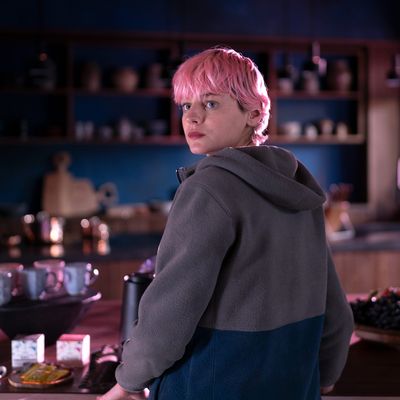
By the end of the first two episodes of A Murder at the End of the World, we understand how the show’s structure will be. There are two parallel stories: one focused on Darby and Bill’s true-crime investigation documented in The Silver Doe, and one focused on Darby’s present-day investigation into Bill’s death at a retreat in Iceland. The split isn’t even; this is a murder mystery, first and foremost, and the present day will always take precedence. But perhaps because of the fragmented nature of this narrative, there’s a bigger risk than usual that both stories may feel pressed for time — especially with only seven episodes’ worth of them.
Then again, plenty of comparable modern-day mysteries have accomplished as much in less time. (I’m not a huge Glass Onion fan, but Knives Out fits the bill.) It seems like the issue comes down to priorities: An episode like “Chapter 3: Survivors” just isn’t overly concerned with developing the supporting cast, typically a crucial task for a murder mystery of this kind.
Take Rohan, who is by far the least developed of the cast in the first two episodes. This one finally gives him time to shine. With Ray’s help, Darby learns Rohan is a climatologist who went off the grid in 2006. During an arduous snowshoe trip, she forces him to stop avoiding her, and he finally opens up about what Bill meant to him: He credits Bill with getting him sober during a period of very heavy drinking five years ago, when his research left him at his most pessimistic and hopeless about the climate. Bill also helped him shift his way of thinking more broadly with his death-begets-life perspective.
Soon after this moment of candor, however, Darby spots Rohan’s red-laced boots once the group has reached the summit and makes a startling discovery: He was the man she followed last night, a masked figure who sneaked out to deliver cryptic messages in Morse code at the top of an icy cliff. “One down, still a go,” Darby quotes to him now, to which he coldly replies, “Careful, girl.” He reiterates that he would never hurt Bill, and we have no real reason to doubt him here despite the danger in his voice.
Especially because he’s dead by the end of the episode. It’s a shame to lose Rohan just as we were starting to really get to know him. It almost feels as if we’re back to square one with a cast full of mostly unfriendly people we still don’t really know. The glimpses of the other characters here are almost all brief, and most are hostile. Ziba sings to set Bill’s spirit free; Sian continues to condescend by urging Darby to accept Ronson’s generosity instead of making a spectacle of herself; David patronizingly calls Darby a “smart little girl” after suggesting they get a drink. Everyone’s just a suspect, each one still hardly indistinguishable from the next, a fact highlighted by Darby’s hallucinations of her fellow guests wearing the mask from the doorbell footage.
There is some progress on the investigation and on Darby’s general quest to figure out how everyone here knows one another. After interrogating a waiter, she learns three cups of tea were being delivered to Bill’s room at the time of his death. She also learns more from Lee about her history with Bill: They got close after he had tracked Lee to her parents’ old place in Florida, where she was hiding out post-doxing. They hooked up once, in the midst of her on-and-off relationship with Andy before she had Zoomer. (Again, I am scrutinizing the timing of that child’s birth very closely.)
The snowshoe expedition itself allows for more of the series’ exploration of how the ultrawealthy might combat the impending climate apocalypse. The sprawling image of a whole army of self-organizing, self-repairing robots at work is both awe-inspiring and unsettling; Darby clearly can’t suppress her fascination despite herself. Ronson explains that this was all accomplished thanks to Oliver’s robotics company. (We still really know nothing about Oliver as a person, except that he thought FANGS was full of shit.)
We get more insight into Ronson’s ambitions during one of his friendliest chats with Darby yet. He casually likens himself to Walt Disney, especially in the latter’s gift for creating real-world visualizations of the abstract ideas in his mind. By breeding hamsters, he had the idea to leap AI forward by “mating” his language-processing algorithm with his home-security system. That’s how Ray was created.
But Ronson quickly turns cold after he gets tired of bragging. Sick of Darby’s snooping, he “suggests” she leave the retreat and go home to deal with her grief, shutting down her masked-murderer theories with the fact that Bill injected himself four minutes before the guest showed up at his door. As with a lot of the other guests here, there’s so much arrogance (and barely coded misogyny) in the way he speaks to Darby, calling her “fragile” and dismissing the possibility that the police have missed something.
By the end of “Chapter 3,” it’s impossible to ignore the truth of what’s happening. During an emotional phone conversation between Darby and Rohan, we get so tantalizingly close to learning more about the secret Bill uncovered — a secret Rohan himself thinks he has figured out. (He also confirms he was the masked man on his way to visit Bill; he didn’t want the meeting on the record, and those masks are good for thwarting facial recognition.) But then, of course, he starts choking before he can get the words out, and he’s gone. The only option left is to lock everyone down.
Rohan’s death is a little frustrating, but that final phone call has a lot of resonance, especially with the earnestness and pain of two near-strangers connecting over a shared loss: “I know you loved Bill. I know you love him still … Because I love him still too.” Maybe it’s such a striking moment because Darby has so few allies in the hotel; Lee is really the only other person who has opened up to her, and she’s deeply suspicious. It’s rare to see Darby connect with someone in the present day, and while that makes her perspective feel appropriately isolated, it means we don’t get as much tonal variety in the present as in the past.
That pattern generally holds true for this episode, though the flashback story is briefer this time. By this point, it seems Darby and Bill have hit a solid groove in tracking victims, following the serial killer’s trail of silver jewelry from one to the next. When they meet Marta Diaz, the killer’s “only survivor,” they’re able to lock in another piece of the puzzle: It turns out the man left a silver high-school class pin in her back seat, one that was likely owned by his previous victim and was left here as the next intended link in the chain.
It’s tough for Marta to dredge up old memories of the attempted abduction, but she comes away from the experience with some unexpected solace. Nothing will ever make the assault un-happen, and nothing will un-kill those young women. But closure is still possible, and it’s overwhelming to see that there are people who still care. Watching in doubt, then fascination and gratitude, as Bill posts a photo of the pin and gets near-immediate assistance from other online sleuths, she’s finally convinced by these two ambitious young people who want to make a difference. She urges them not to give up.
The murderer in Iceland may have little in common with the murderer in Iowa, but it’s easy to see the ways Darby can’t stop getting hung up on the contrast. Back in the Midwest, she had a reliable partner who loved her and supported her no matter what. At the end of “Chapter 3,” for a minute, it feels as though Darby may find a new one — somebody with whom she can be honest, no matter what truths he has hidden from her in the past. Maybe losing Rohan hurts less because of his characterization than what it represents: another plunge back into aloneness.
Zeroes and Ones
• Bill’s apparently provocative political art includes removing the S from Shell gas stations so the signs just say “hell.” Stick it to the man, FANGS.
• Rohan mentions he had heart failure two years ago, so his pacemaker must have something to do with his death, especially based on the call Marius receives at the end.
• It was a lovely transition with Darby whipping herself up a coffee-and-Coke, thinking back to the time Bill tried that gross combo and immediately spit it out.


